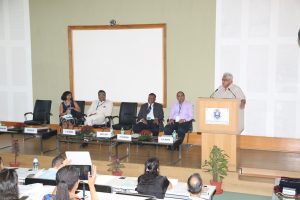Chennai, 1 November, 2019: India needs to focus on its higher education for building a Five Trillion Dollar economy.
Stressing that universities are the engine for innovation, economic growth and social development, Founding Vice Chancellor of O.P. Jindal Global University, Prof. C. Raj Kumar outlined a 10-point ambitious growth and reform plan for the Indian Universities at an event in Chennai today. He observed that this plan will enable them to move up in the global rankings.
“Global rankings have emerged as a dominant way of measuring performance. There is today a serious debate on the need for Indian universities to be in the top 200 universities of the world and the urgency of seeking reforms that will pave the way for promoting excellence in higher education and research. It is important that Indian universities embrace the international rankings framework as well as international accreditation processes which will benchmark Indian universities with the world class universities in many countries,” explained Prof Raj Kumar.
Also present on the occasion was Prof. Tom Goldstein, Dean of the Jindal School of Journalism and Communication. Both of them emphasized the need for Indian higher educational institutions to be at par with their international counterparts and also invest in strategies, vision and infrastructure to ensure they break into globally recognised international rankings.
Today, the Times Higher Education World Universities Rankings, QS World University Rankings, and the Shanghai Jiatong Rankings have become part of the institutional aspirations for many universities and higher education institutions in India, he said. “The challenges related to higher education in India deserve urgent attention and require determined responses.”
Attention must be paid to the poor performance of Indian universities in the global rankings and take note of the criteria required to succeed in world ranking, especially the importance of research and publications. Other factors that influence ranking include academic innovation, intellectual freedom, and research excellence are constantly promoted. In addition, internationalisation is an important criterion for breaking into the global rankings. This includes measures on the number and influence of international students, international faculty, global engagements and partnerships on research, teaching, and faculty and student exchange. The global ranking frameworks have increasingly become an indicator of the institutional quality of higher education institutions and are a powerful measure of real-world impact of universities and their role as knowledge creators.
ABOUT THE O.P. JINDAL GLOBAL UNIVERSITY
The Government of India has recognised JGU as an “Institution of Eminence”. JGU is an initiative of the Jindal Steel & Power Foundation.
Founded in 2009, O.P. Jindal Global University (JGU) is a non-profit global and research oriented university established by the Government of Haryana and recognised by the University Grants Commission (UGC). JGU maintains a 1:10 faculty-student ratio and appoints faculty members from India and different parts of the world with outstanding academic qualifications and experience. With over 5000 students studying and living on a fully residential campus, JGU’s eight schools are: law, business, international affairs, public policy, liberal arts & humanities, journalism, art & architecture and banking & finance. This year, JGU became the youngest Indian university to break into the QS World University Rankings 2020. JGU is the only Indian private university in the top 150 ‘young’ universities in the world (under 50 years of age) in the QS Young University Rankings 2020. JGU is the youngest University in the world to feature in both these rankings.

